Mark Rutte facts for kids
Quick facts for kids
Mark Rutte
|
|
|---|---|
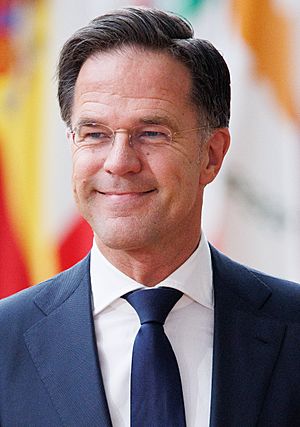
Rutte in 2023
|
|
| 14th Secretary General of NATO | |
| Assumed office 1 October 2024 |
|
| Deputy | Radmila Šekerinska |
| Preceded by | Jens Stoltenberg |
| Prime Minister of the Netherlands | |
| In office 14 October 2010 – 2 July 2024 |
|
| Monarch | |
| Deputy |
See list
Maxime Verhagen
(2010–2012) Lodewijk Asscher
(2012–2017) Hugo de Jonge
(2017–2022) Kajsa Ollongren
(2017–2022) Wopke Hoekstra
(2022–2023) Carola Schouten
(2017–2024) Sigrid Kaag
(2022–2024) Karien van Gennip
(2023–2024) Rob Jetten
(2024) |
| Preceded by | Jan Peter Balkenende |
| Succeeded by | Dick Schoof |
| Leader of the People's Party for Freedom and Democracy | |
| In office 31 May 2006 – 14 August 2023 |
|
| Preceded by | Jozias van Aartsen |
| Succeeded by | Dilan Yeşilgöz |
| State Secretary for Education, Culture and Science | |
| In office 17 June 2004 – 27 June 2006 |
|
| Prime Minister | Jan Peter Balkenende |
| Preceded by | Annette Nijs |
| Succeeded by | Bruno Bruins |
| State Secretary for Social Affairs and Employment | |
| In office 22 July 2002 – 17 June 2004 |
|
| Prime Minister | Jan Peter Balkenende |
| Preceded by | Hans Hoogervorst |
| Succeeded by | Henk van Hoof |
| Member of the House of Representatives | |
| In office 31 March 2021 – 10 January 2022 |
|
| In office 23 March 2017 – 26 October 2017 |
|
| In office 20 September 2012 – 5 November 2012 |
|
| In office 28 June 2006 – 14 October 2010 |
|
| In office 30 January 2003 – 27 May 2003 |
|
| Personal details | |
| Born | 14 February 1967 The Hague, Netherlands |
| Political party | VVD |
| Education | Leiden University (BA, MA) |
| Signature | |
Mark Rutte (born 14 February 1967) is a Dutch politician. He became the 14th Secretary General of NATO in October 2024. Before this, he was the prime minister of the Netherlands from 2010 to 2024. He also led the People's Party for Freedom and Democracy (VVD) from 2006 to 2023.
Mark Rutte served as prime minister for almost 14 years. This makes him the longest-serving prime minister in Dutch history. He first worked in business for a company called Unilever. In 2002, he started his national political career.
Rutte won the VVD party leadership election in 2006. He then led his party to win the 2010 general election. After many talks to form a government, he became prime minister. He was the first self-described liberal prime minister in the Netherlands in 92 years.
His first government ended early in 2012 due to budget disagreements. But his party won the next election. This allowed Rutte to become prime minister again. He led his second government, which was the first to complete a full four-year term since 1998. Even though his party lost some seats in the 2017 election, it was still the largest. He then formed his third government.
In 2021, Rutte's government resigned because of a scandal about childcare benefits. However, his party won the 2021 election. He started his fourth term as prime minister in 2022. In July 2023, his government resigned again. This happened because they could not agree on how to handle migration. Rutte's government continued to run the country until a new government was formed in July 2024.
People sometimes called Rutte 'Teflon Mark'. This was because political problems seemed to not affect him. He is also seen as a practical leader who can work with different groups.
Contents
Early Life and Education
Mark Rutte was born in The Hague, Netherlands. He was the youngest of eight children. His father, Izaäk Rutte, was a merchant. His mother, Hermina Cornelia Dilling, was a secretary. His father worked for a trading company. He was an importer in the Dutch East Indies and later ran a car dealership.
Rutte attended Maerlant Lyceum from 1979 to 1985. He studied arts there. He first wanted to be a concert pianist. But he decided to study history at Leiden University. He earned a master's degree in 1992. While studying, he was active in the Youth Organisation Freedom and Democracy. This is the youth group of the VVD party. He was its chairman from 1988 to 1991.
After university, Rutte worked in business. He was a manager for Unilever and its food company Calvé. He worked in the human resources department. He helped with several company changes. He also worked as a staff manager and human resource manager for other Unilever companies.
Political Career Beginnings
From 1993 to 1997, Rutte was part of the VVD's national board. In 2002, he became a State Secretary (like a deputy minister). He worked at the Social Affairs and Employment Ministry. He was in this role from July 2002 to June 2004. He was responsible for things like municipal welfare and Occupational safety and health. He was also briefly a member of the House of Representatives in 2003.
In 2003, Rutte supported the US-led invasion of Iraq.
From June 2004 to June 2006, Rutte was State Secretary for Higher Education and Science. He worked at the Education, Culture and Science Ministry. He wanted to make the Dutch higher education system better. He aimed to make it more competitive globally. In June 2006, Rutte left his government job. He returned to the House of Representatives. He soon became the VVD's leader in Parliament.
Becoming Party Leader
After the VVD lost in the 2006 local elections, the party needed a new leader. Mark Rutte ran against other candidates. On 31 May 2006, he was chosen as the new leader of the VVD. He won with 51.5% of the party members' votes. Many important VVD politicians supported him. He promised to make the VVD a party for everyone.
Elections as Party Leader
In the 2006 general election, Rutte's campaign had a difficult start. Some people in his own party criticized him. He was seen as being overshadowed by other politicians. In the end, another VVD candidate, Rita Verdonk, received more votes than him. Later, Rutte removed Verdonk from the party's group in Parliament.
In the 2010 general election, Rutte was again the VVD's main candidate. His party won 31 seats. For the first time, the VVD became the largest party in the House of Representatives. After long talks to form a government, Rutte formed a coalition. It was with the Christian Democrats (CDA) and supported by the Party for Freedom (PVV).
Prime Minister of the Netherlands
|
Premiership of Mark Rutte
|
|
|---|---|
| 14 October 2010 – 2 July 2024 | |
| Premier | Mark Rutte |
| Cabinet |
|
| Party | People's Party for Freedom and Democracy |
| Election | 2010, 2012, 2017, 2021 |
| Appointer | Beatrix of the Netherlands Willem-Alexander of the Netherlands |
| Seat | Torentje |
First Term as Prime Minister
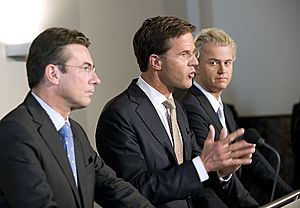
After getting support for his coalition, Rutte was asked to form a government. On 14 October 2010, he presented his first cabinet to Parliament. He was sworn in as Prime Minister of the Netherlands. He was the first Liberal prime minister since 1918. At 43 years old, he was also the second-youngest prime minister in Dutch history.
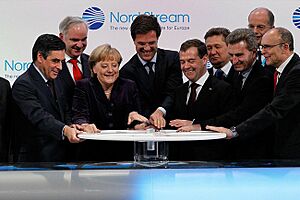
In March 2012, Rutte's government tried to cut government spending. This was to meet rules from the European Union. But the PVV party, which supported his government, withdrew its support. This caused the government to collapse early. Rutte resigned on 23 April 2012. His government lasted for 558 days.
Second Term as Prime Minister
For the 2012 general election, Rutte was again the VVD's main candidate. His party won 10 more seats in the election. It remained the largest party. The VVD quickly formed a government with the Labour Party. Rutte became prime minister of the Second Rutte cabinet on 5 November 2012.
In 2014, The Hague hosted a special meeting of the Group of Seven leaders. This happened after Malaysia Airlines Flight 17 was shot down in Ukraine. Many Dutch citizens were on board.
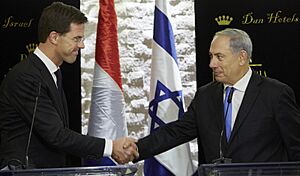
In April 2016, Rutte was chosen to be part of a High-Level Panel on Water. This panel was set up by the United Nations Secretary-General and the President of the World Bank Group. Its goal was to help achieve Sustainable Development Goal 6. This goal is about clean water and sanitation.
Rutte's second government completed its full four-year term. This was the first time a Dutch government had done this since 1998.
Third Term as Prime Minister
In the 2017 general election, the VVD lost 8 seats. But it remained the largest party in Parliament. After long talks, Rutte formed a new government. It was a coalition with the CDA, D66, and CU. He became prime minister for a third term on 26 October 2017. The time it took to form this government was the longest in Dutch history.
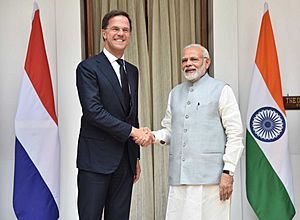
In July 2018, Rutte gained international attention. He interrupted and corrected American president Donald Trump during a press meeting. This was seen as "typical Dutch bluntness." In the 2019 provincial elections, Rutte's party faced a challenge from a new right-wing party.
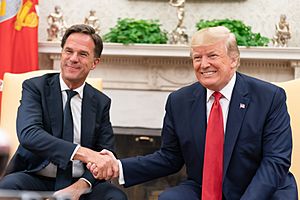
In 2020, during talks about the COVID-19 recovery fund, Rutte was a key figure. He led a group of countries that wanted loans instead of grants. On 15 January 2021, Rutte's third government resigned. This was due to a scandal involving childcare subsidies. Rutte took responsibility for the issue.
Fourth Term as Prime Minister
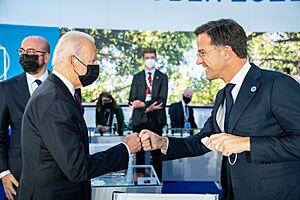
After the 2021 Dutch general election, Rutte's VVD party had 34 out of 150 seats. He formed a new government with the same parties as his previous one. This was the longest government formation process in Dutch history.
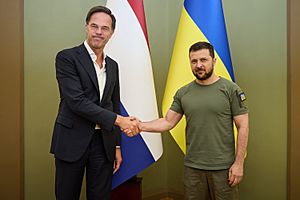
In October 2022, Rutte said that alleged war crimes during the Armenian-Azerbaijani war should be investigated.
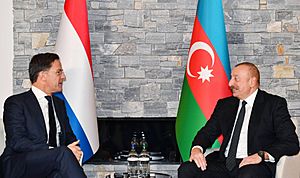
In January 2023, the U.S., Japan, and the Netherlands agreed to limit certain advanced chip exports to China. The Dutch government then placed restrictions on chip exports. This affected ASML, a major Dutch company in the microchip industry.

On 7 July 2023, Rutte's four-party government resigned. The parties could not agree on immigration policy. Three days later, Rutte announced he would leave politics after the next government was formed.
While still prime minister, Rutte condemned the October 7 attacks in 2023. He supported Israel's right to self-defense. He visited Israel to show support. He rejected calls for a ceasefire in the Gaza war but supported "humanitarian pauses" for aid. In February 2024, a Dutch court ordered the government to stop exporting parts for F-35 fighter jets to Israel.
General elections were held early on 22 November 2023. The VVD party was then led by Dilan Yeşilgöz.
In February 2024, Rutte visited Saudi Arabia. He also went to Paris for a summit on the situation in Ukraine. He announced that the Netherlands would provide €250 million to buy artillery ammunition for Ukraine. On 1 March, he visited Kharkiv with Ukrainian president Volodymyr Zelenskyy. They signed a security agreement between the Netherlands and Ukraine.
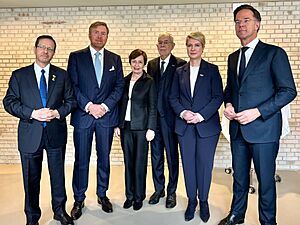
Later in March 2024, Rutte met with Chinese president Xi Jinping. He discussed the Russian invasion of Ukraine and urged China to influence Russia. He said Russia's success in Ukraine would threaten all of Europe. On 14 April 2024, Rutte condemned the Iranian strikes against Israel. He called for sanctions against Iran.
In May, Rutte's government allowed Ukraine to use Dutch-supplied F-16 fighters to strike targets inside Russia. Rutte attended the June 2024 Ukraine peace summit. He saw Putin's proposal for peace talks as a sign of panic.
Rutte's fourth term as prime minister ended on 2 July 2024. This was when the Schoof cabinet was sworn in. The new cabinet is led by Dick Schoof.
Secretary General of NATO
2024 Activities

After leaving Dutch politics, Rutte became the Secretary General of NATO on 1 October 2024. He took over from Jens Stoltenberg at the NATO Headquarters in Brussels. Rutte had announced his interest in the role in October 2023. He received support from the United States, United Kingdom, Germany, and France. He was officially appointed on 26 June 2024.

In October 2024, Rutte stated that over 600,000 Russian soldiers had been killed or wounded in the war against Ukraine. As Secretary General, Rutte urged NATO member nations to increase their defense spending. He said a wartime mindset was needed to protect against a potential Russian attack.
Rutte has often called for more weapons to be sent to Ukraine. He believes any future peace talks with Russia should be led by Ukraine from a strong position.
Rutte also criticized China's actions towards Taiwan. He said China was "bullying Taiwan" and trying to access important infrastructure. He added that Russia, China, North Korea, and Iran are trying to weaken North America and Europe. He believes they want to change the global order to benefit themselves.
2025 Activities
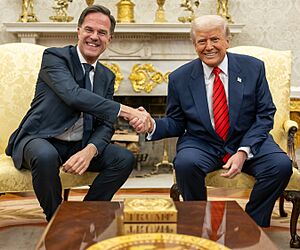
In March 2025, after the new Trump administration stated it did not support NATO membership for Ukraine, Rutte commented on the situation. He said Ukraine had never been promised NATO membership as part of a peace agreement. He also suggested that Europe and the US should eventually normalize relations with Russia after a peace agreement.
The 2025 The Hague NATO summit was the first for Rutte as Secretary General. This summit, held in his hometown, aimed to balance the views of Donald Trump and Ukrainian President Volodymyr Zelenskyy.
In June 2025, Rutte supported US strikes on Iranian nuclear nuclear sites. In a private message, he praised and thanked Trump for his "decisive action" in Iran. He called it "truly extraordinary."
Personal Life
Mark Rutte is single and has no children. He is a member of the Dutch Protestant Church. While he was prime minister, Rutte taught social studies on Thursday mornings. He taught at the Johan de Witt College, a secondary school in The Hague.
Rutte admires American historian Robert Caro. He especially likes Caro's 1974 book about Robert Moses, The Power Broker. He drives a Saab 9-3 estate car. Before moving to Brussels in 2024 for his NATO role, he lived in an apartment in The Hague for many years.
Honours and Awards
 Australia: Honorary Companion of the Order of Australia (9 October 2019)
Australia: Honorary Companion of the Order of Australia (9 October 2019) France: Grand Officer of the Order of Legion of Honour (11 April 2023)
France: Grand Officer of the Order of Legion of Honour (11 April 2023) Italy: Knight Grand Cross of the Order of Merit of the Italian Republic (20 December 2022)
Italy: Knight Grand Cross of the Order of Merit of the Italian Republic (20 December 2022) Luxembourg: Grand Cross of the Order of Merit of the Grand Duchy of Luxembourg (7 June 2024)
Luxembourg: Grand Cross of the Order of Merit of the Grand Duchy of Luxembourg (7 June 2024) Netherlands: Knight Grand Cross of the Order of the Netherlands Lion (2 July 2024)
Netherlands: Knight Grand Cross of the Order of the Netherlands Lion (2 July 2024) Ukraine: Knight of the Order of Prince Yaroslav the Wise, 1st degree (27 January 2023)
Ukraine: Knight of the Order of Prince Yaroslav the Wise, 1st degree (27 January 2023)- People's Party for Freedom and Democracy: Honorary member (30 November 2024)
Electoral History
| Year | Body | Party | Pos. | Votes | Result | Ref. | ||
|---|---|---|---|---|---|---|---|---|
| Party seats | Individual | |||||||
| 2003 | House of Representatives | People's Party for Freedom and Democracy | 11 | 4,297 | 28 | Won | ||
| 2006 | 1 | 553,200 | 22 | Won | ||||
| 2010 | 1 | 1,617,636 | 31 | Won | ||||
| 2012 | 1 | 2,129,000 | 41 | Won | ||||
| 2017 | 1 | 1,760,117 | 33 | Won | ||||
| 2021 | 1 | 1,977,651 | 34 | Won | ||||
See also
 In Spanish: Mark Rutte para niños
In Spanish: Mark Rutte para niños
- List of international prime ministerial trips made by Mark Rutte
 | James Van Der Zee |
 | Alma Thomas |
 | Ellis Wilson |
 | Margaret Taylor-Burroughs |

